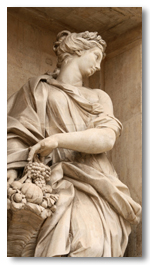Manners and Holiness
- TOM HOWARD
My wife and I have a friend, a lady and lady is the right word here who is what earlier centuries, especially in England, would have called high-born.

|
My wife and I have a friend, a lady and lady is the right word here who is what earlier centuries, especially in England, would have called high-born. I suppose the term blue-blood might apply. There is an air about her that has occasioned several piquant conversations between my wife and me.
This air, be it said hastily, is at a polar extreme from what one might run into in this connection on Broadway, or in cheap novels and journalism and popular imagination. Quite the contrary. Our friend arrives at the front door in a great breeze of good cheer. She is happy to see you, and finds everything you say to her over lunch to be nothing but interesting and encouraging. She quite genuinely wants to know about you and your children, and what you all are doing these days, and how everyone is getting on. You realize afterwards that not once did she seize the chance to turn the conversation to herself and her own family and concerns. Oh, to be sure, she will cheerfully fill you in (not at any great length) if you ask her about herself. But then you get, But tell me about your two grandsons. I must hear about them.
We have known this lady for perhaps 30 years and have been with her in all sorts of situations. Her forthcoming and cheerful approach to life seems to be unflagging. She is wholly interested in what someone has to say at a cocktail party, for example. You never hear from her any of the usual fatuities that prevail in these situations. Her random daily contacts with the grocer, say, or with the gardener or the gas station man, evince the same thing. But there is nothing frivolous or merely social about any of it. Life has brought her some great sorrows, and even though she would never volunteer a syllable touching on any of them, you find a true and sympathetic understanding of anyone else's troubles.
Do the manners that seem to derive from a background of gentility, grace, and self-effacement exempt fortunate people like our friend from the Holy Ghost's salvific chastening?
She is always perfectly dressed. St. Francis de Sales would be happy with her response to his counsel to the women to whom he gave spiritual direction:
As to the material and style of our clothing, decency should be considered in reference to the various circumstances of time, age, rank, company, and occasion. It is a sort of contempt of those you associate with to frequent their company in unbecoming attire. At the same time avoid all affectation and vanity, all extremes and frivolity. As far as possible keep always to the side of simplicity and modesty, for this is undoubtedly beauty's greatest ornament (Introduction to the Devout Life).
The question here that I raise while my wife and I have our morning tea: Where is the line between mere manners and sanctity? One struggles along in the Christian life, fencing forever with irritability and petulance and parsimony of spirit and pique and so forth. The lessons in the school of charity in this connection are far from easy. Really, one needs the word warfare here rather than lessons, it seems. Do the manners that seem to derive from a background of gentility, grace, and self-effacement exempt fortunate people like our friend from the Holy Ghost's salvific chastening?
Our friend wouldn't think so. She happens to be a Christian now, and no one knows, of course, what goes on in her prayers and in her soul. But we knew her before her conversion, and she seemed just as wonderful back then.
Well, we mortals look on the outward appearance. God alone knows our hearts. The question, however, still intrigues me.
 This is Meaghen Gonzalez, Editor of CERC. I hope you appreciated this piece. We curate these articles especially for believers like you.
This is Meaghen Gonzalez, Editor of CERC. I hope you appreciated this piece. We curate these articles especially for believers like you.
Please show your appreciation by making a $3 donation. CERC is entirely reader supported.

Acknowledgement
Tom Howard. Manners and Holiness. Crisis 24, No. 6 (July/August 2006): 64.
This article is reprinted with permission from the Morley Institute a non-profit education organization. To subscribe to Crisis magazine call 1-800-852-9962.
The Author
 Thomas Howard taught for many years at St. John's Seminary College, the Roman Catholic seminary of the archdiocese of Boston. He became Episcopalian in his mid-twenties, then entered the Catholic Church in 1985. Among the books he has authored are Chance or the Dance?, The Night Is Far Spent, Evangelical is Not Enough, If Your Mind Wanders at Mass, On Being Catholic, Dove Descending: A Journey Into T.S. Eliot's Four Quartets, and The Secret of New York Revealed. Howard's story of why he became Catholic is called Lead, Kindly Light: My Journey to Rome.
Thomas Howard taught for many years at St. John's Seminary College, the Roman Catholic seminary of the archdiocese of Boston. He became Episcopalian in his mid-twenties, then entered the Catholic Church in 1985. Among the books he has authored are Chance or the Dance?, The Night Is Far Spent, Evangelical is Not Enough, If Your Mind Wanders at Mass, On Being Catholic, Dove Descending: A Journey Into T.S. Eliot's Four Quartets, and The Secret of New York Revealed. Howard's story of why he became Catholic is called Lead, Kindly Light: My Journey to Rome.


